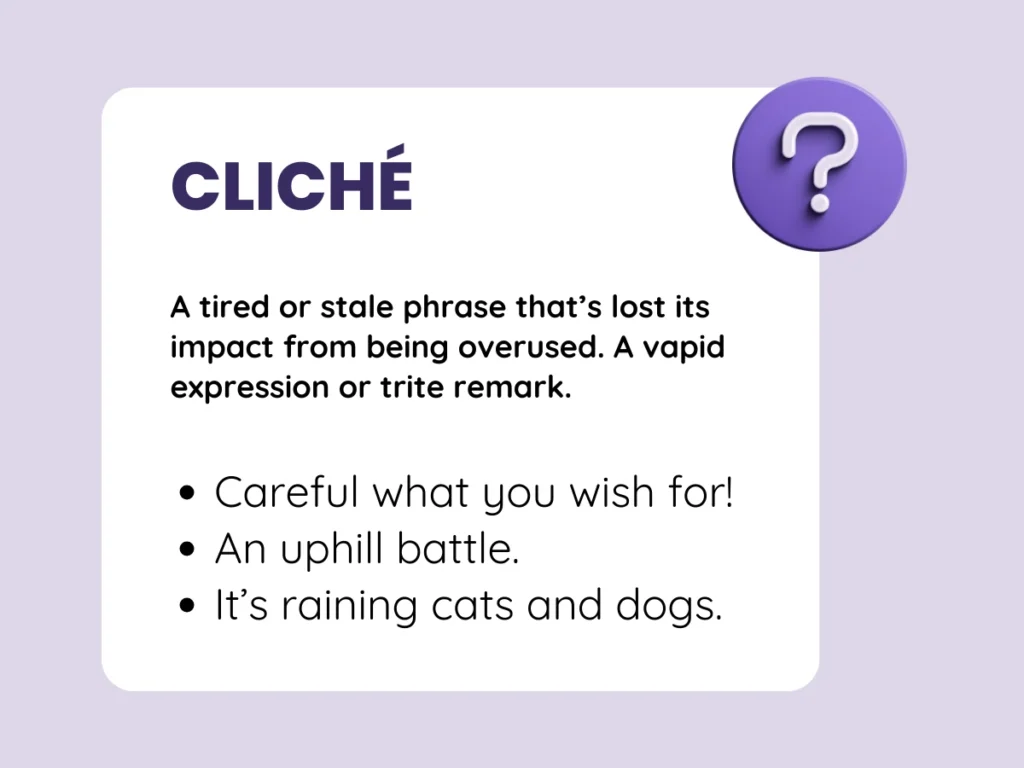There are plenty of fish in the sea.
The grass is always greener on the other side.
You can’t judge a book by its cover.
What’s a cliché?
That phrase has been overused for years.
The first poet compared a woman to a rose.
You have broke a promise.
They throwed the ball yesterday.
Whether you’re a native English speaker or not, you’ve probably heard these extremely popular phrases and idioms in English. These phrases are so common you could argue they’re cliché (sounds like klee–shay).

Meaning of the word cliché
“The first man who compared a woman to a rose was a poet, the second, an imbecile.” – Gérard de Nerval
But what is a cliché, exactly? The dictionary defines the word cliché as a “phrase or opinion that is overused and betrays a lack of original thought”. So, does that make a cliché any old worn-out phrase that’s lost its original impact through overuse? This is precisely what makes a cliché a cliché. Simply put, clichés are trite phrases that have lost their impact from overuse.
Are clichés the same as idioms?
Clichés are often idioms, but this doesn’t mean all idioms are clichés. Idioms overused to the point where they are annoying are considered clichés. For example, “the elephant in the room” is a term that’s been exhausted, and so is a cliché, but it still conveniently expresses an idea in just a few words. This is why the phrase endures in use and popularity; it’s a cliché for a reason!
When to use clichés
Clichés are overused for a reason: they efficiently communicate what might be a complex idea in a concise and straightforward way. They are clichés because they are used so frequently, after all. So, despite the hate that clichés get in writing, they still have their use in conversation and text.
In other words, clichés are completely acceptable and common in daily conversation or text; we use them all the time. That said, when it comes to writing, whether literary, academic, or formal, it’s best to be sparing in the use of clichés so that the writing doesn’t come across as unoriginal or trite.
What a cliché is, associate it with overused phrases like “it’s raining cats and dogs”— the more familiar the overused expression, the easier it is to recall the definition.
Examples of clichés
- There are plenty more fish in the sea
- Think outside the box
- Grab the bull by the horns
- It goes without saying
- At the end of the day
- I’ve got my plate full
- Every cloud has a silver lining
- There’s no “I” in team
- Since the dawn of time
- In this day and age
- Don’t judge a book by its cover
- In a nutshell
- Lost track of time
- As old as the hills
- Fit as a fiddle
- Without a care in the world
- A diamond in the rough
- Brave as a lion
- Weak as a kitten
- Had nerves of steel
- Ugly as sin
- Opposites attract
- Every cloud has a silver lining
- Don’t cry over spilled milk
- The calm before the storm
- Laughter is the best medicine
- Love you more than life itself
- Scared out of my wits
- Frightened to death
- All is fair in love and war
- All’s well that ends well
- Haste makes waste
- The writing’s on the wall
- Time heals all wounds
- What goes around comes around
- When life gives you lemons, make lemonade
- Head over heels in love
- Gut-wrenching pain
- Heart-stopping fear
Synonyms of cliché
- adage
- banality
- bromide
- buzzword
- commonplace
- motto
- slogan
- stale saying
- platitude
- proverb
- shibboleth
- truism
- triviality
- stereotype
- triteness
- boiler plate
- trite remark
- vapid expression
- threadbare phrase
- counter word
Origin of the word cliché
1825, “electrotype, stereotype,” from French cliché, a technical word in printer’s jargon for “stereotype block,”
Originally, a cast obtained by letting a matrix fall face downward upon a surface of molten metal on the point of cooling, called in English type-foundries ‘dabbing.’ [OED] Figurative extension to “trite phrase, worn-out expression” is first attested 1888, via the notion of the metal plate from which a print or design could be reproduced endlessly without variety, paralleling the sense evolution of stereotype.
Read more about literary devices
- What’s Alliteration?
- What is Irony?
- What is Verbal Irony?
- What is Dramatic Irony?
- What’s Situational Irony?
- What’s a Hyperbole?
Work Sheet
According to the blog post, what is a primary characteristic of a cliché?
Based on the post, what is the relationship between idioms and clichés?
When does the blog post suggest it is best to be sparing in using clichés?
According to the post, why do clichés endure despite being overused?
How does the blog post suggest associating the definition of a cliché?
The dictionary defines a cliché as a phrase or opinion that is overused and betrays a lack of original .
Clichés are trite phrases that have lost their from overuse.
The phrase “the elephant in the room” is mentioned as an example of an overused idiom that has become a .
Clichés are completely acceptable and common in daily or text.
The blog post lists “Think outside the ” as an example of a cliché.
Frequently Asked Questions
What is a cliché?
+
Are clichés the same as idioms?
+
When should I use clichés?
+
Why are clichés so common?
+
Can you give examples of clichés?
+
Yash, D. "What’s a Cliché? (Meaning, Usage & Examples)." Grammarflex, Jun 17, 2025, https://www.grammarflex.com/whats-a-cliche-meaning-usage-examples/.
Sources
-
Harper, Douglas. “Etymology of cliche.” Online Etymology Dictionary, Accessed 30 November 2023.











